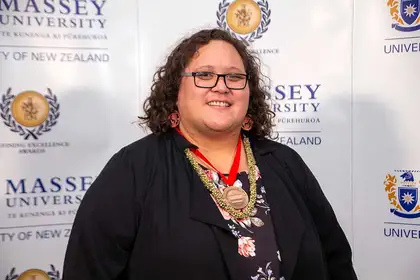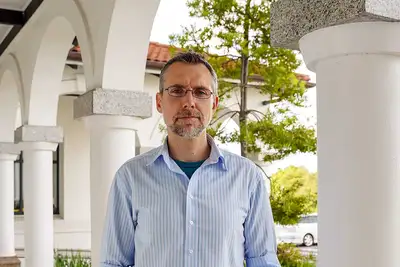
Dr Krushil Watene, whose work explores how Māori concepts can be used to address issues of sustainability and social justice.
To mark World Philosophy Day (November 21) Māori philosopher Dr Krushil Watene is keen to highlight the work of her colleagues and students, who she says are demonstrating the value of philosophical thought in solving some of society’s most complex and urgent problems.
Dr Watene, from the School of Humanities, says Massey’s commitment to including Māori and other indigenous philosophical traditions is leading the way in this part of the world and contributes to solving problems that are particularly pressing for our region.
“Many of the challenges we face have a severe impact on the lives that we and future people will be able to live. People the world over are searching for new and stronger approaches to wellbeing, sustainability, and justice to take us into the future” she says. “What we find within indigenous philosophies are concepts and ideas that can provide us with a change in perspective at a time when fresh eyes are so urgently required.”
The United Nations’ 2019 World Philosophy Day aims to highlight the importance of philosophy in different regional contexts. The goal is to obtain regional contributions to global debates on contemporary challenges that support social transformations, its website says.
Head of the School of Humanities Associate Professor Kerry Taylor says he is delighted to see that the research is so central to solving significant issues at the nexus of justice and sustainability.
Antarctica and indigenous connections
Dr Watene says postdoctoral philosophy researcher Vincent van Uitregt, of Ngā Rauru, Tuhoe and the Netherlands, is part of a team bringing science and Māori philosophy together to address some of the urgent challenges we face.
Dr van Uitregt says Antarctica is one of the most important places on Earth. “It tells us a great deal about our impact on this planet and its wellbeing,” he says. “But in our current situation, with the advent of radical climate change, Antarctica is also a place that can shine much needed light on our processes of decision-making, our governance structures, and our willingness to work together toward a common future.”
He says “Māori philosophy can provide us with perspectives and tools to shape effective collective responses to global climate change.” It also brings to the fore a much-needed environmental and inter-generational lens. “We need to act together in ways that ensure the future of this planet and the well-being of future generations.”

Marco Grix, who explores issues of consumerism, ethics and wellbeing through philosophical questioning.
Consumerism threat to planet and people
Philosopher Marco Grix completed his doctoral thesis on the ethics and politics of consumption this year. Having grown up in East Germany and experienced the dramatic influx of consumer goods after the fall of the Berlin Wall, Mr Grix discovered philosophy when he moved to New Zealand. Through philosophy, he questions the meaning of western consumerism and its impact, and how it relates to the quest for a good life.
“The social and environmental costs of present-day consumerism are painfully obvious”, he says. “Worldwide, the lives of people and other life forms are affected by our consumption practices every day. For instance, we drink from disposable plastic bottles that take 450 years to biodegrade, use paper originating from rain forests that retreat at dramatic rates and drive fuel-guzzlers running on oil bought from repressive regimes. We consume this way because often we merely repeat what those around us do, unthinkingly and uncritically.”
He says we rarely consider the actual aim of our consumption, and how unequally the ability to consume is distributed. “Philosophy helps us answer questions that should guide all our consumption choices and actions. What does ‘good human life’ mean? What consumption is necessary for such a life, and what do we merely desire? Which basic goods and services is everyone entitled to, both in New Zealand and across the globe?”
Justice and energy transition
The work of Ushana Jayasuriya, a tutor and doctoral philosophy student working with Dr Watene, explores practical ways of transitioning from fossil fuels to renewable energy.
“Such a transition reduces emissions to meet global goals to combat climate change, and is driven by local communities,” Ms Jayasuriya says. “Philosophy offers the conceptual tools we need to design transition policies that take account of people’s lives and lead to just outcomes.”